- Home
- Joan Lowery Nixon
Secret, Silent Screams Page 2
Secret, Silent Screams Read online
Page 2
Karen leaned forward intently. “Listen to the facts,” she said. “The tape was there.”
“Someone else must have put it there.”
Karen sighed, “There was a note. It was in Barry's handwriting.”
“Are you sure it was his handwriting?”
“A handwriting analyst with the Houston crime lab checked it out. He was positive. Do you know about the note?”
Marti closed her eyes against the pain. Of course she knew about the note and what it said. It had been quoted on the front page of the Houston newspapers. In a whisper she repeated,” The thought of suicide is a great consolation.’” Her eyelids snapped open. “Barry wouldn't have written that. It's not the way he talked or thought.”
“Marti, be reasonable,” Karen said. “Keep an open mind.”
“I am.”
“Barry shot himself with a Rossi .22 handgun. He shot himself in the right side of the head.”
Marti jumped to her feet, her fingers twisted together and pressed tightly against her chest. It was even harder to fight off the burning tears, but she managed to get her voice under control. “See? That's what I mean,” she said. “You might not believe me about the music and the note, but you have to believe this. Barry didn't shoot himself.”
“But his fingerprints were the only ones on the gun, and powder burns were on his right hand.”
“That's it!” Marti cried, and in her intensity she reached across the corner of the desk and clutched both of Karen's hands. “He couldn't! He wouldn't! have shot himself like that! Barry was left-handed!”
CHAPTER • 2
Marti walked home, the low September sun a deep red splash, simmering in its own smoldering heat waves. Sweat plastered the dress to her back, and the humidity caused her hair to frizz out ill puffs around her face.
Barry had liked to tease her about her hair. “It looks like cotton candy,” he had said the summer before they began seventh grade. “I'd like it even better if it was pink.”
He had bought a packet of some kind of dye, and together they had turned her hair into a flufiy pink cloud. It was later, after Marti's mother had finally finished a long and horrified complaint of “What will people think!” that they found it was a kind of dye that wouldn't easily wash out. Marti really hadn't minded. While it lasted she liked the pink hair. It made her feel different and special, and in spite of the fact that a few people pointed and snickered, Barry had told her she looked terrific.
Barry.
Marti angrily kicked at a pebble that lay on the sidewalk. It had taken all the courage she had to go to the police for help and pour out the truth about Barry, but that officer—Karen—had studied her for a few minutes as though she could see all the way through to Marti's brain, and said only, “I'll give this some thought.” That was a favorite statement for adults who wanted to stall, to get you off their backs. They'd make you wait forever for the answer, which always turned out to be “no.” Marti had no illusions that Karen would help.
As she turned into Castle Lake Drive she saw two cars parked in front of the Logans’ house. She supposed that people would have come and gone all through the day. Marti and her mother had visited with Mr. and Mrs. Logan after the funeral. Mom had stayed to help with the food—taking a day off from her accountant's job—and had sent Marti on to school. But Marti hadn't gone back to school with the others in Barry's class who'd been excused to attend the funeral. She had gone to the police station instead.
Impulsively, she turned into the walkway leading to the Logans’ front door, pausing at the landscaped entryway as the door opened and two couples came out murmuring comforting words, hugging and patting Mrs. Logan as they said their good-byes.
Mrs. Logan—small-boned, trim, and not a bit like Barry—beckoned to Marti. “I'm so glad you came back, dear,” she said. “It was a beautiful service, wasn't it? And all Barry's friends—how nice of them to be there.”
Marti gulped through the tight ache in her throat and followed Mrs. Logan into the living room, sitting down opposite her on the matching blue love seats. She tried not to look at the shuttered doors that closed off the den.
“Would you like something to eat?” Mrs. Logan went on. “Everyone's brought so much food. There's sliced ham and—oh, yes——a bowl of that orange-pineapple gelatin salad you like so much. Most of it's been put in the refrigerator, but you know where everything is in the kitchen, so you can help yourself.”
Marti shook her head. “I'm really not hungry, Mrs. Logan. I just hoped that maybe we could talk.” She shrugged, feeling even more miserable. “I know that you've been talking to people all day and you're probably tired, hut if you wouldn't mind listening to me for just a few minutes I'd—”
Mr. Logan came into the living room from the hall that extended to the bedrooms, saying, “You were right, Alice. The nap helped.” He was tall and muscular and deeply tanned from his almost daily exercise on the golf course—so much like Barry that it hurt Marti to look at him, He spotted Marti and his eyes widened. “I'm so used to seeing you sitting there that it's like it … it hadn't happened,” he said. He sat down next to his wife, his shoulders suddenly rounding and slumped like those of an old man, and she took his hand, squeezing it gently.
“Did Barry tell you, Marti?” Mr. Logan said. “The day before—before he—died, he received a letter from A & M. He made early acceptance.”
Marti nodded. “He called me right away.”
“He was so proud of making the early list.”
“I'm sorry about Barry,” Marti whispered. “He was one of my best friends. I miss him terribly.”
“Yes, yes. We all miss him,” Mr. Logan mumbled.
But Mrs. Logan closed her eyes and said, “Forgive us, Marti. It's our fault that Barry died. The doctor and the police asked if we'd recognized the signs, and we hadn't. We should have recognized the signs.”
“It's not your fault.” Marti leaned toward them, her elbows resting on her knees. “There were no signs … because Barry didn't commit suicide. I went to the police this afternoon and told them.”
They didn't react positively, as Marti had hoped. Mr. Logan's face twisted in pain, and Mrs. Logan murmured, “Oh, dear. You shouldn't have done that. What good could it do?”
“I hoped the police could find out what really happened to Barry. I know he didn't kill himself.”
Mrs. Logan whimpered, and Mr. Logan absent-mindedly stroked his wife's hand. “Marti,” he said, “don't try for the impossible. It only makes it harder for you.”
“But wouldn't you rather know that Barry hadn't taken his own life?”
Mrs. Logan began to cry, and she spoke through her tears as though she didn't know they were there. “We failed Barry in some way. We don't even know how or why. He didn't come to us. He didn't talk things over with us. We didn't even have a chance to help him.”
“It wasn't like that—” Marti began.
“It's going to haunt us forever,” Mrs. Logan said. “I go past his room, and I think about … I remember … I … how could he have done this to himself? To us?”
“He didn't!” Marti insisted. “If someone would just listen to me—”
Mr. Logan managed to struggle to his feet. “Marti,” he said wearily, “you must he hungry. There's a lot of food left The refrigerator is full. Why don't you get a plate and help yourself?”
“I know Barry didn't commit suicide!”
“Paul,”. Mrs. Logan said,” we'll;have to sell this house, I can't bear living here after—”
“Thank you for coming, Marti If you'd just go now … ” Mr. Logan's voice was as raw and rough as if it had been rubbed across a metal grater.
“I didn't mean to hurt you” Marti stammered. fighting against the frustration and pain that welled in her throat and threatened to choke her. “I'm sorry. I thought you'd believe, as I do, that Baryy wouldn't give up. He knew there was so much to live for. He wouldn't have—”
Mr. Logan placed a hand on her arm.
“It's all right,” he said. “We understand. You mean well. It's hard for us to accept too.”
As Mrs. Logan burrowed her head against the arm of the love seat arid began to sob loudly, the way a child would cry, Marti ran from the house and raced across the lawn to her own home, hiding away in her ruffled rose and white bedroom until her own tears were spent. She'd made everything worse for the Logans, and she hadn't meant to. Why wouldn't anyone believe her?
She sat cross-legged on the bed, trying to think. Maybe she could get some help from Barry's friends— maybe one or more of the remaining Cuatros. She could picture the four of them—so often together. Charlie was the tallest and stockiest. with a thick shock of dark brown hair. He looked older than the others, even though he was the youngest by two months. Tony, black-eyed and good-looking, was the shortest but made up for it by working out until he had muscles all the guys envied. Thad was thin, with olive-green eyes and dark blond hair. He smiled a lot, but his smile had always made Marti uncomfortable. And Barry, with his sandy hair and deep blue eyes that crinkled with laugh lines at the corners … Barry was handsome and bright and full of fun and—
Marti rolled over on her stomach and squirmed across the quilt until she could reach the telephone and her address book. She looked up Charlie Villeret's phone number and dialed.
When Charlie answered she told him bluntly much of what she had told Officer Prescott.
After she had finished, the line was silent for a few moments as though Charlie had clapped his hand over the mouthpiece. When he spoke she could hear the tears in his voice. “Hey, Marti,” he said, “we all feel the same way. It's hard to take. But don't jump off like that. You sound kind of weird.”
“But didn't you hear me? I told you—”
“I know what you told me.” He was obviously trying to be patient. “Look. You say that someone murdered Barry.”
“That's right.”
“Okay, then. Who?”
“Who? That's what I don't know.”
“Think about it. Barry didn't have any enemies. Who'd kill him and try to make it look like a suicide? One of us? One of his friends?”
“No. Of course not,” Marti stammered.
Charlie let out a long sigh. “Then forget it. Please. Just forget all this, and let it be over.”
“Forget it? Every time you remember Barry do you want to think of him as Someone who took his own life and hurt everybody who loved him?”
There was a gasp, then silence. Finally Charlie said, That's not lair.”
“Will you help me?”
“There's nothing I can do.”
“Yes, there is,” Marti said. “You can answer some questions for me.”
“The police already asked me questions. I've told them every thing'I knew.”
“Charlie, I need to find out everything I can about Barry and how he was feeling and what he was thinking.”
Charlie groaned, “Not now, Marti. I don't want to talk about Barry now.” The line went dead.
Marti dialed Tony's number next. After she had told him what she'd told Charlie, Tony just snapped, “You're crazy!”
“I need you and Charlie to help me.”
“Give it up,” Tony said. “You're just going to drag everything out and make it a lot worse for everybody.”
“I want to ask you some questions,” she said.
“Forget it!” Marti winced at the sound of the receiver being slammed into place.
She wearily climbed from the bed and leaned against the frame of her bedroom window. Light from the arc lamps on the street outlined the Logan house. There were lights within the house too, the kitchen light spilling into long rectangles across the lawn. Directly across from her upstairs room was the dark, covered glass of Barry's bedroom window, When they were young, they had sent each other flashlight signals and secret messages through their bedroom windows, and one summer—in an attempt to try a circus tightrope act —they had a strung a rope between the two houses, tying it securely to their bedposts. Barry had gone first. With his weight on the rope, her bed had scraped across the floor, slamming into the wall, leaving Barry hanging on to the sagging rope. He yelled at the top of his lungs until she could drag her father's double ladder from the garage to help him down. When their parents had come home from work that night, each set asking, “Did you have a nice day?” Marti and Barry had answered, “Yes,” finding no reason to mention their foiled tightrope act.
Marti leaned her head against the frame and closed her eyes to keep back the hot and painful tears. She had known Barry even better than she knew Kim. He'd been an everyday part of her life. They'd shared, they'd fought, they'd confided in each other. She'd been wary of whom he dated, not hesitating to make blunt comments about a couple of the girls; and he'd responded in kind, sometimes behaving like an obnoxious big brother.
She lightly touched the tip of one finger to her lips as she remembered that her first kiss had been from Barry. But aside from a few tentative, playful moments, there had been no romance between them. At the back of her mind Marti had almost expected that when they were older, when they were ready for something real, she and Barry would find each other.
Now it was too late.
“Marti!” her mother called from the foot of the stairs. “Kim's here.”
Marti ran to throw open the door and shout down, “Kim! Come on up!” If anyone would listen and understand, it would be Kim.
Kim, who was as short as Marti was tall, as darkhaired as Marti was blonde, ran up the stairs and wrapped her friend in a clumsy hug. Kim, who'd been discouraged politely from ever attending another ballet elass and who'd been kicked off the swim team, had kept trying to find her niehe until she happily landed on the Yearbook staff. She never allowed anything to disrupt her good-natured outlook on life, and all her bubbling optimisni seemed to spill over on those around her.
Marti badly needed to talk to Kim. She sat on the floor opposite Kim, her back to the window so die couldn't see Barry's house, and told Kim everything she had thought and done and said about Barry's death.
But Kim's look was one of pity as she answered, “Marti, the police called it a suicide. This is their business. They know what they're doing.”
The tight knot in Marti's chest grew more painful. “I thought you'd help me.”
“Of course I'll help you. Whatever you want. Just tell me, and I'll do it.”
“But you don't believe me,” Marti murmured.
Kim looked down at her hands, and her voice was a bare whisper. “I'm sorry, Marti,” she said. “I can't. I don't.”
Marti hadn't wanted to go to class the next morning, but her mother had said, “You have to pick up where you left off. The world keeps going on, and you have to go with it.”
“Those are cliches,” Marti muttered, aware that she was unreasonably angry that her mother looked the way she always did, so dully neat and businesslike and unperturbed in her cool gray jacket and skirt, a perfectly tied black bow at the neck of her white blouse. It wasn't fair that the world went on as though nothing had happened.
Mom had simply shrugged, her palms held outward helplessly, and Marti could see her own pain reflected in her mother's eyes. “It's the only way I know how to say it,” Mom said. “It's hard to talk about death. The words always sound all wrong and fake, as though they were copied from those awful sentimental greeting cards. I'm sorry, Marti. Nothing really helps much, does it?”
Impulsively, Marti hugged Mom, holding tightly, needing the strength of her mother's arms around her. “I miss Barry so much,” she mumbled.
“Oh, darling, of course you do,” Mom said.
“I think about him all the time. Even when I'm sleeping. Over and over I have the same dream. Barry thinks he's alone in the house, but someone else is there too. It's a dark shadow that creeps up on Barry, and I'm supposed to stop the shadow, but I can't. And I try to scream, but I can't. And I wake up crying because I wonder if there was something I could have done to help Barry.”
/>
“Marti, you mustn't confuse your dreams with the truth,” Mom said. “Theres nothing you—” There was an impatient toot of a horn, in the driveway, and Mom made a quick grab for her briefcase. “We'll try to find time to talk tonight,” she said; “Your father's impatient. He's got an early meeting.” She planted a kiss that slid off Marti's right ear, and added as she whirled toward the door, “Marti, you mustgo to school. It's the only way to handle it.”
“I will,” Marti promised. She couldn't think of a good reason not to.
But later, wheu the entire student body was called to the cafetdrium for an assembly, she was sorry for that promise. Mr. Billingsly, the balding, rotund principal of Farrington Park High School, conducted a short memo-rid for Barry, which turned out to be more of an embarrassed apology that one of Farrington Park's finest, most promising students had been so misguided as to take his own life. Marti dug her fingernails into the palms of her hands, concentrating on the pain, refusing to listen to what Mr. Billingsly was saying.
She was thankful when he bowed his head and called for one minute of silence. All she wanted was to get out of this place. She was tired and dizzy, and as she stared at the little specks in the asphalt tile floor, they began to quiver and wiggle. Marti squirmed On the bench, and Kim, who was squeezed tightly next to her, touched her arm. “Hang on,” Kim whispered. “There's not much more he can say.”
But Kim was wrong. Mr. Billingsley suddenly raised his head with a look of relief, as though he'd been counting the seconds, and announced, “Many of you have heard of Dr. Clement Granberry, a nationally known psychologist who has written a number of best-selling self-help books. Dr. Granberry has become concerned with the rising number of teenage suicides across the United States and is gathering information for a book exploring the problem. He contacted me after learning through the news media about Barry Logan's suicide and graciously asked to speak to—”
Marti stumbled to her feet, shouting, “No! It's not true! It's a lie!”
Mr. Billingsly's mouth, pink and fleshy, hung limply open as he and Marti goggled at each other over a waving sea of hundreds of pairs of wide-open, shocked eyes. Marti clapped her hands to the sides of her head and screamed, “Barry didn't kill himself! He didn't! Barry was murdered!”

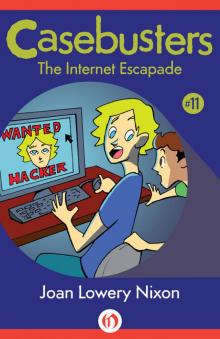 The Internet Escapade
The Internet Escapade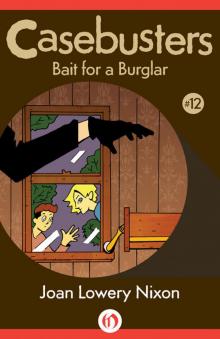 Bait for a Burglar
Bait for a Burglar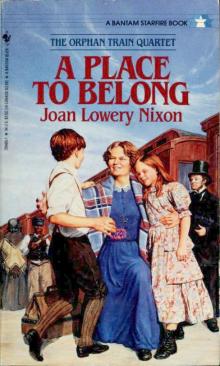 A Place to Belong
A Place to Belong Nightmare
Nightmare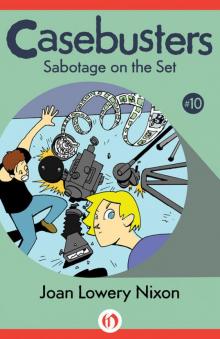 Sabotage on the Set
Sabotage on the Set The Other Side of Dark
The Other Side of Dark Whispers from the Dead
Whispers from the Dead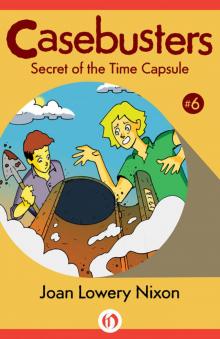 Secret of the Time Capsule
Secret of the Time Capsule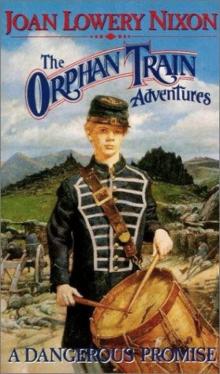 A Dangerous Promise
A Dangerous Promise Laugh Till You Cry
Laugh Till You Cry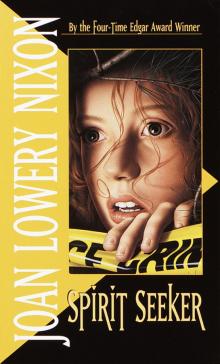 Spirit Seeker
Spirit Seeker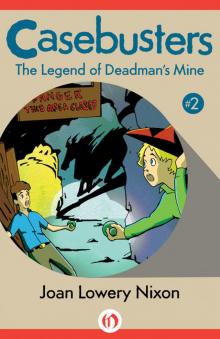 The Legend of Deadman's Mine
The Legend of Deadman's Mine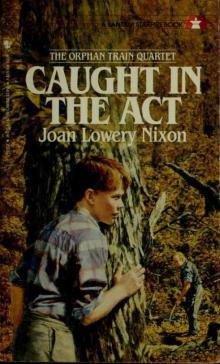 Caught in the Act
Caught in the Act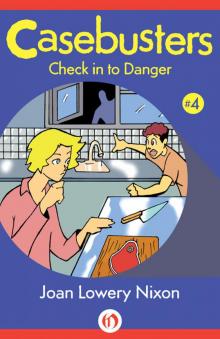 Check in to Danger
Check in to Danger Ellis Island: Three Novels
Ellis Island: Three Novels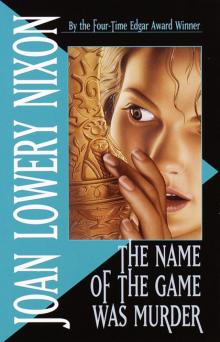 The Name of the Game Was Murder
The Name of the Game Was Murder The Haunting
The Haunting Lucy’s Wish
Lucy’s Wish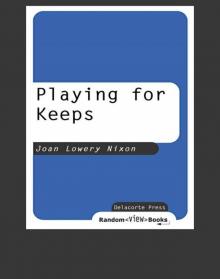 Playing for Keeps
Playing for Keeps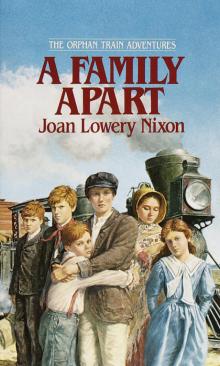 A Family Apart
A Family Apart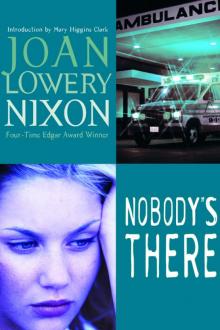 Nobody's There
Nobody's There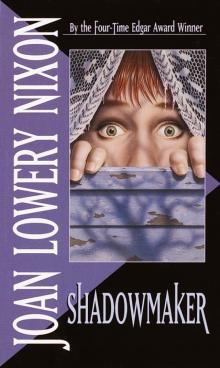 Shadowmaker
Shadowmaker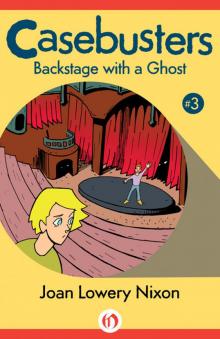 Backstage with a Ghost
Backstage with a Ghost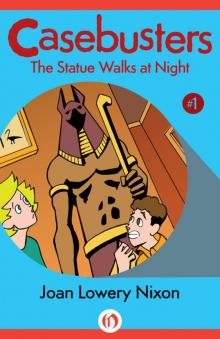 The Statue Walks at Night
The Statue Walks at Night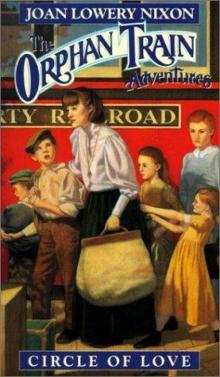 Circle of Love
Circle of Love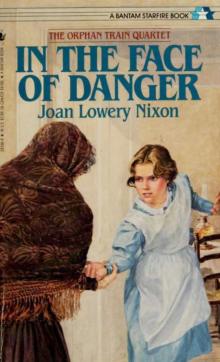 In the Face of Danger
In the Face of Danger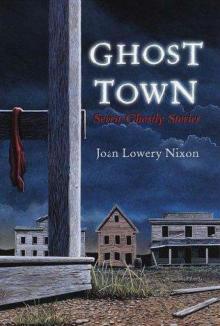 Ghost Town
Ghost Town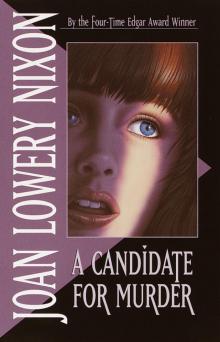 A Candidate for Murder
A Candidate for Murder The Weekend Was Murder
The Weekend Was Murder The Island of Dangerous Dreams
The Island of Dangerous Dreams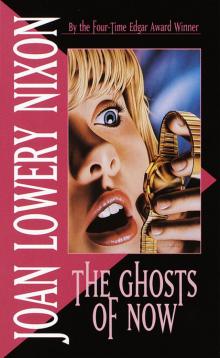 The Ghosts of Now
The Ghosts of Now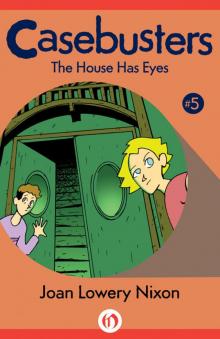 The House Has Eyes
The House Has Eyes The Dark and Deadly Pool
The Dark and Deadly Pool Keeping Secrets
Keeping Secrets Secret, Silent Screams
Secret, Silent Screams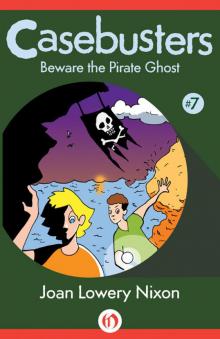 Beware the Pirate Ghost
Beware the Pirate Ghost Search for the Shadowman
Search for the Shadowman Haunted Island
Haunted Island